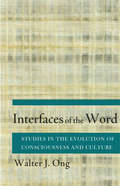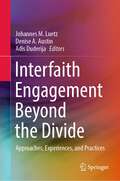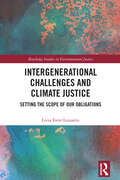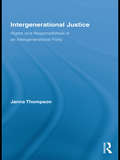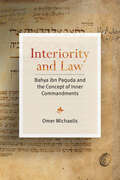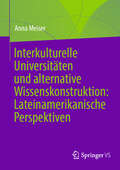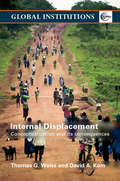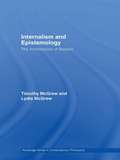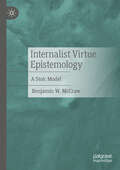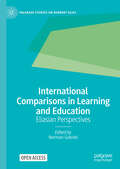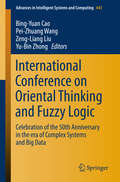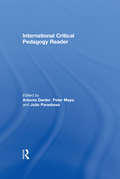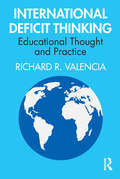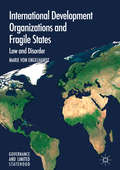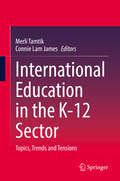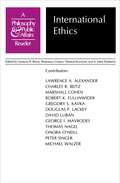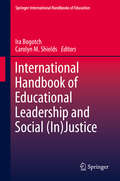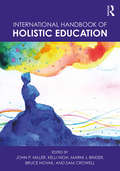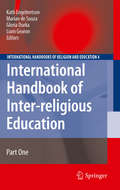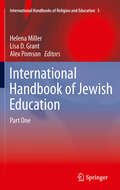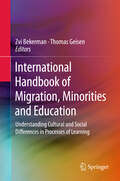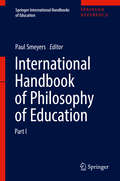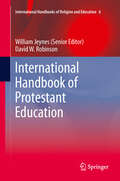- Table View
- List View
Interfaces of the Word: Studies in the Evolution of Consciousness and Culture
by Walter J. OngIn Interfaces of the World, Walter J. Ong explores the effects on consciousness of the word as it moves through oral to written to print and electronic culture.
Interfaith Engagement Beyond the Divide: Approaches, Experiences, and Practices
by Adis Duderija Johannes M. Luetz Denise A. AustinThis book features reflections by scholars and practitioners from diverse religious traditions. It posits that the global challenges facing humanity today can only be mastered if humans from diverse faith traditions can meaningfully collaborate in support of human rights, reconciliation, sustainability, justice, and peace. Seeking to redress common distortions of religious mis- and dis-information, the book aims to construct interreligious common ground ‘beyond the divide’.Organised into three main sections, the book features sixteen conceptual, empirical, and practice-informed chapters that explore spirituality across faiths and cultures. Chapter 1 delineates the state of the art in relation to interfaith engagement, Chapters 2–8 advance theoretical research, Chapters 9–12 discuss empirical perspectives, and Chapters 13–16 showcase field projects and recount stories and lived experiences.Comprising works by scholars, professionals, and practitioners from around the globe, Interfaith Engagement Beyond the Divide: Approaches, Experiences, and Practices is an interdisciplinary publication on interreligious thought and engagement:Assembles a curated collection of chapters from numerous countries and diverse religious traditions;Addresses interfaith scholarship and praxis from a range of interdisciplinary perspectives;Comprises interfaith dialogue and collaborative research involving authors of different faiths;Envisions prospects for peace, interreligious harmony in diversity, and a world that may be equitably and enduringly shared.The appraisal of present and future challenges and opportunities, framed within a context of public policy and praxis, makes this interdisciplinary publication a useful tool for teaching, research, and policy development. Chapter 16 is available open access under a Creative Commons Attribution 4.0 International License via link.springer.com.
Intergenerational Challenges and Climate Justice: Setting the Scope of Our Obligations (Routledge Studies in Environmental Justice)
by Livia Ester LuzzattoClimate change poses questions of intergenerational justice, but some of its features make it difficult to determine whether we have obligations of climate justice to future generations. This book offers a novel argument, justifying the present generation’s obligations to future people. Livia Luzzatto shows that we have intergenerational obligations because many of our actions are based on presuppositions about future people. When agents engage in such intergenerational actions, they acquire an obligation to also recognize those future people as agents within their principles of justice, and with that a duty to respect their agency and autonomy. Intergenerational Challenges and Climate Justice also offers a way to circumvent the problems of non-identity and non-existence. Its approach overcomes the intergenerational challenges of climate change by meeting three necessary criteria: providing ways to cope with uncertainty, dealing with the complexity of climate change, and including future people for their own sake. The author meets these criteria by adopting an action-centered methodology that grounds our obligations of justice on the presuppositions of activity. This robust framework can be used to justify increased climate action and the greater inclusion of future-oriented policies in current decision making. This book will be of great interest to academics and students concerned with the issues of climate and intergenerational justice.
Intergenerational Justice: Rights and Responsibilities in an Intergenerational Polity (Routledge Studies in Contemporary Philosophy)
by Janna ThompsonIn this timely study, Thompson presents a theory of intergenerational justice that gives citizens duties to past and future generations, showing why people can make legitimate demands of their successors and explaining what relationships between contemporary generations count as fair. What connects these various responsibilities and entitlements is a view about individual interests that both argues that individuals are motivated by intergenerational concerns, and that a polity that appropriately recognizes these interests must support and accept intergenerational responsibilities. The book ranges over the philosophical, ethical, political and environmental questions raised by intergenerational issues: how we can have duties to non-existent people, whether we can wrong the dead or be held responsible for what they did, what sacrifices we should make for our successors, and whether we have duties to people of the remote future. Encompassing the ethical problems created by demographic change, the ethical issues of population control and intergenerational implications of new technologies for creating people, this book will be of interest to those studying philosophy, politics, legal theory, and environmental studies.
Interiority and Law: Bahya ibn Paquda and the Concept of Inner Commandments (Stanford Studies in Jewish Mysticism)
by Omer MichaelisInteriority and Law presents a groundbreaking reassessment of a medieval Jewish classic, Baḥya ibn Paquda's Guide to the Duties of the Hearts. Michaelis reads this work anew as a revolutionary intervention in Jewish law, or halakha. Overturning perceptions of Baḥya as the shaper of an ethical-religious form of life that exceeds halakha, Michaelis offers a pioneering historical and conceptual analysis of the category of "inner commandments" developed by Baḥya. Interiority and Law reveals that Baḥya's main effort revolved around establishing a new legal formation—namely, the "duties of the hearts"—which would deal entirely with human interiority. Michaelis takes up the implications of Baḥya's radical innovation, examining his unique mystical model of proximity to God, which he based on an increasingly growing fulfillment of the inner commandments. With an integrative approach that puts Baḥya in dialogue with other medieval Muslim and Jewish religious thinkers, this work offers a fresh perspective on our understanding of the interconnectedness of the dynamic, neighboring religious traditions of Judaism and Islam. Contributing to conversations in the history of religion, Jewish studies, and medieval studies on interiority and mysticism, this book reveals Baḥya as a revolutionary and demanding thinker of Jewish law.
Interkulturelle Universitäten und alternative Wissenskonstruktion: Lateinamerikanische Perspektiven
by Anna MeiserDie seit rund zwanzig Jahren in ganz Lateinamerika gegründeten „Interkulturellen Universitäten“ erheben gegenüber den Hochschulen euroamerikanischer Tradition den Anspruch einer „alternativen“ Forschung und Lehre. Die Arbeit analysiert, wie solche Universitäten lokale und indigene Wissenstraditionen in Dialog mit „westlichen“ Wissenschaftsdiskursen zu bringen und damit Wissen interkulturell zu konstruieren suchen. Sie zeigt dabei Wege zu einer Dekolonialisierung von Wissenschaft und Hochschulbildung auf, reflektiert die ethnologische Fachtradition und deren methodisches Arbeiten und diskutiert das allgemeine Potential einer Interkulturalisierung von Wissenschaft. Grundlage dieser Analyse sind umfassende Feldforschungen vor allem in Ecuador und Mexiko.
Internal Displacement: Conceptualization and its Consequences (Global Institutions)
by Thomas G. Weiss David A. KornThis new volume traces the normative, legal, institutional, and political responses to the challenges of assisting and protecting internally displaced persons (IDPs). The crisis of IDPs was first confronted in the 1980s, and the problems of those suffering from this type of forced migration has grown continually since then. Drawing on official and confidential documents as well as interviews with leading personalities, Internal Displacement provides an unparalleled analysis of this important issue and includes: an exploration of the phenomenon of internal displacement and of policy research about it a review of efforts to increase awareness about the plight of IDPs and the development of a legal framework to protect them a 'behind-the-scenes' look at the creation and evolution of the mandate of the Representative of the Secretary-General on IDPs a variety of case studies illustrating the difficulties in overcoming the operational shortcomings within the UN system a foreword by former UN high commissioner for refugees, Sadako Ogata. Internal Displacement will appeal to students and scholars with interests in war and peace, forced migration, human rights and global governance.
Internalism and Epistemology: The Architecture of Reason (Routledge Studies in Contemporary Philosophy)
by Timothy McGrew Lydia McGrewThis book is a sustained defence of traditional internalist epistemology. The aim is threefold: to address some key criticisms of internalism and show that they do not hit their mark, to articulate a detailed version of a central objection to externalism, and to illustrate how a consistent internalism can meet the charge that it fares no better in the face of this objection than does externalism itself. This original work will be recommended reading for scholars with an interest in epistemology.
Internalist Virtue Epistemology: A Stoic Model
by Benjamin W. McCrawThis monograph works at the intersection of two of the most popular and growing fields in epistemology: epistemic normativity or value and virtue epistemology. By challenging two hitherto un- or under-explored sets of assumptions—epistemological orthodoxies—operative in those fields and, by rejecting them, the book develops novel approaches to current theories of epistemic value and virtue. The book argues that what is needed is an internalist (i.e. non-externalist) mode of epistemic virtue. To accomplish this, it draws on Stoic moral theory, whereby the deployment of virtue—no matter whether one has any &‘external&’ success—suffices for completely successful action.
International Animal Research Regulations: Workshop Summary
by Diana E. PankevichAnimals are widely used in neuroscience research to explore biological mechanisms of nervous system function, to identify the genetic basis of disease states, and to provide models of human disorders and diseases for the development of new treatments. To ensure the humane care and use of animals, numerous laws, policies, and regulations are in place governing the use of animals in research, and certain animal regulations have implications specific to neuroscience research. To consider animal research regulations from a global perspective, the IOM Forum on Neuroscience and Nervous System Disorders, in collaboration with the National Research Council and the Institute for Laboratory Animal Research, held a workshop in Buckinghamshire, UK, July 26-27, 2011. The workshop brought together neuroscientists, legal scholars, administrators, and other key stakeholders to discuss current and emerging trends in animal regulations as they apply to the neurosciences. This document summarizes the workshop.
International Comparisons in Learning and Education: Eliasian Perspectives (Palgrave Studies on Norbert Elias)
by Norman GabrielThis Open Access edited volume addresses the important role of education in society through the lens of theoretical concepts developed by Norbert Elias. This book sets out to challenge dominant perspectives within the sociology of education by reorientating traditional debates about socialisation, childhood, early years education, care, schooling and the curriculum, focusing on the relational learning processes that lie at the heart of pedagogic relationships between parents, teachers, children and peers. It also offers an innovative perspective on some of the key debates in childhood studies, bringing together and relating the different aspects of childhood through a generational lens. Authors from different countries follow young children as they grow up and learn how to become civilized in institutions in contemporary society, discussing how from one generation to the next they learn from adults and their peers an enormous social fund of knowledge about their world.
International Conference on Oriental Thinking and Fuzzy Logic
by Bing-Yuan Cao Zeng-Liang Liu Yu-Bin Zhong Pei-Zhuang WangThis proceedings book presents edited results of the eighth International Conference on Fuzzy Information and Engineering (ICFIE'2015) and on Oriental Thinking and Fuzzy Logic, in August 17-20, 2015, in Dalian, China. The book contains 65 high-quality papers and is divided into six main parts: "Fuzzy Information Processing", "Fuzzy Engineering", "Internet and Big Data Applications", "Factor Space and Factorial Neural Networks", "Information Granulation and Granular Computing" as well as "Extenics and Innovation Methods".
International Critical Pedagogy Reader
by Antonia Darder Peter Mayo João Paraskeva<p>Carefully curated to highlight research from more than twenty countries, the International Critical Pedagogy Reader introduces the ways the educational phenomenon that is critical pedagogy are being reinvented and reframed around the world. A collection of essays from both historical and contemporary thinkers coupled with original essays, introduce this school of thought and approach it from a wide variety of cultural, social, and political perspectives. <p>Academics from South America, Europe, Africa, the Middle East, Asia, and North America describe critical pedagogy’s political, ideological, and intellectual foundations, tracing its international evolution and unveiling how key scholars address similar educational challenges in diverse national contexts. Each section links theory to critical classroom practices and includes a list of sources for further reading to expand upon the selections offered in this volume. A robust collection, this reader is a crucial text for teaching and understanding critical pedagogy on a truly international level. </p>
International Deficit Thinking: Educational Thought and Practice
by Richard R. ValenciaInternational Deficit Thinking: Educational Thought and Practice explores the incontrovertible reality of the persistent and pervasive academic achievement gap in many countries between marginalized students (primarily of color) and their economically advantaged White counterparts. For example, International Deficit Thinking discusses the cases of low-socioeconomic Black and Mexican American students in the United States, Indigenous Māori students in New Zealand, and immigrant Moroccan and Turkish pupils in Belgium. The predominant theoretical perspective that has been advanced to explain the school failure of marginalized students is the deficit thinking paradigm—a parsimonious, endogenous, and pseudoscientific model that blames such students as the makers of their own school failure. Deficit thinking asserts that the low academic achievement of many marginalized students is due to their limited intellectual ability, poor academic achievement motivation, and being raised in dysfunctional families and cultures. Drawing from, in part, critical race theory, systemic inequality analysis, and colonialism/postcolonialism, award-winning author and scholar Richard R.Valencia examines deficit thinking in education in 16 countries (e.g., Canada; Peru, Australia; England; India; South Africa). He seeks to (a) document and debunk deficit thinking as an interpretation for school failure of marginalized students; (b) offer scientifically defensible counternarratives for race-, class-, language-, and gender-based differences in academic achievement; (c) provide suggestions for workable and sustainable school reform for marginalized students.
International Development Organizations and Fragile States
by Marie Von EngelhardtThis book addresses a conundrum for the international development community: The law of development cooperation poses major constraints on delivering aid where it is needed most. The existence of a state with an effective government is a basic condition for the transfer of aid, making development cooperation with 'fragile' nations particularly challenging. The author explores how international organizations like the World Bank have responded by adopting formal and informal rules to engage specifically with countries with weak or no governments. Von Engelhardt provides a critical analysis of the discourse on fragile states and how it has shaped the policy decision-making of international organizations. By demonstrating how perceptions of fragility can have significant consequences both in practice and in law, the work challenges conventional research that dismisses state fragility as a phenomenon beyond law. It also argues that the legal parameters for effective global policy play a crucial role, and offers a fresh approach to a topic that is central to international security and development.
International Education in the K-12 Sector: Topics, Trends and Tensions
by Merli Tamtik Connie Lam JamesThis edited volume focuses on K-12 international education in a global context and examines trends, emerging topics, and prevalent tensions. It considers the rapidly growing phenomenon across a variety of country contexts in a way that can convey both empirical evidence and insights into theorization and practical debates. Contributors touch upon a range of emerging trends in K-12 international education globally, including student mobility, curriculum design, language learning, methodological considerations, and policy considerations through a holistic and comprehensive approach. The book also applies a critical decolonial lens in examining K-12 international education by inviting readers to think critically about issues of power, privilege, equity, and social justice in trying to foster a more informed and socially responsible approach to international education. Ultimately, the book attempts to move beyond a one-size-fits-all approach in order to embrace the complexity of issues that emerge from international education involving vulnerable populations. The book is grounded in institutional theory, which allows to explore the complex web of institutional norms, values, and behaviors that are shaping the experiences through international education across the different chapters in this volume. As an edited volume, authored by academic experts and practitioners from around the world, this book provides the most recent and up-to-date account on documenting developments related to K-12 international education internationally. Through contributing significant evidence across international contexts, the book raises new questions and offers new perspectives to the field, opening conversations both within and across governments and non-governmental stakeholders such as educators, students and parents.
International Ethics: A Philosophy and Public Affairs Reader (Philosophy and Public Affairs Readers #3)
by Lawrence A. AlexanderThis book is comprised of essays previously published in Philosophy & Public Affairs and also an extended excerpt from Michael Walzer's Just and Unjust Wars.
International Fascism, 1919-45 (Totalitarianism Movements and Political Religions)
by Robert MallettThe essays that comprise this study of 20th-century fascism shift the focus away from the German and Italian models and towards the influence of fascist ideology within other countries.
International Handbook of Educational Leadership and Social (In)Justice
by Ira Bogotch Carolyn M. ShieldsThe International Handbook on Educational Leadership and Social (In)Justice creates a first-of-its-kind international forum on conceptualizing the meanings of social justice and leadership, research approaches in studying social justice and combating social injustices, school, university and teacher leadership for social justice, advocacy and advocates for social justice, socio-cultural representations of social injustices, glocal policies, and leadership development as interventions. The Handbook is as much forward-looking as it is a retrospective review of educational research literatures on social justice from a variety of educational subfields including educational leadership, higher education academic networks, special education, health education, teacher education, professional development, policy analyses, and multicultural education. The Handbook celebrates the promises of social justice while providing the educational leadership research community with concrete, contextualized illustrations on how to address inequities and combat social, political and economic injustices through the processes of education in societies and educational institutions around the world.
International Handbook of Holistic Education
by John P. Miller Marni J. Binder Kelli Nigh Bruce Novak Sam CrowellProviding a comprehensive overview of holistic education’s history, conceptions, practices, and research, this Handbook presents an up-to-date, global picture of the field. Organized in five sections, the Handbook lays out the field’s theoretical and historical foundations; offers examples of holistic education in practice with regard to schools, programs, and pedagogies at all levels; presents research methods used in holistic education; outlines the growing effort among holistic educators to connect holistic teaching and learning with research practice; and examines present trends and future areas of interest in program development, inquiry, and research. This volume is a must-have resource for researchers and practitioners and serves as an essential foundational text for courses in the field.
International Handbook of Inter-religious Education
by Kath Engebretson Gloria Durka Marian De Souza Liam GearonThis Handbook has the potential to redress the distortion of information about particular religions, to add to understanding about what religions have in common, and to suggest how they can work together for justice and peace. In the present day there is a vital resurgence of interest in religions, with new movements emerging from long established religious traditions. There is also, around the world, a growing sense of the need to preserve indigenous religions, even when these have accommodated to imported traditions. The Handbook gives a voice to this resurgence of interest, and addresses inter-religious education from a range of religious viewpoints and contexts. The publication is very timely especially in light of the need for religions of the world to together contemplate and actively promote human rights, social justice and peace, for religions have a specific mandate for this.
International Handbook of Jewish Education
by Alex Pomson Lisa D. Grant Helena MillerThe International Handbook of Jewish Education, a two volume publication, brings together scholars and practitioners engaged in the field of Jewish Education and its cognate fields world-wide. Their submissions make a significant contribution to our knowledge of the field of Jewish Education as we start the second decade of the 21st century. The Handbook is divided broadly into four main sections: Vision and Practice: focusing on issues of philosophy, identity and planning -the big issues of Jewish Education.Teaching and Learning: focusing on areas of curriculum and engagementApplications, focusing on the ways that Jewish Education is transmitted in particular contexts, both formal and informal, for children and adults.Geographical, focusing on historical, demographic, social and other issues that are specific to a region or where an issue or range of issues can be compared and contrasted between two or more locations.This comprehensive collection of articles providing high quality content, constitutes a difinitive statement on the state of Jewish Education world wide, as well as through a wide variety of lenses and contexts. It is written in a style that is accessible to a global community of academics and professionals.
International Handbook of Migration, Minorities and Education
by Zvi Bekerman Thomas GeisenMigrants and minorities are always at risk of being caught in essentialized cultural definitions and being denied the right to express their cultural preferences because they are perceived as threats to social cohesion. Migrants and minorities respond to these difficulties in multiple ways -- as active agents in the pedagogical, political, social, and scientific processes that position them in this or that cultural sphere. On the one hand, they reject ascribed cultural attributes while striving towards integration in a variety of social spheres, e.g. school and workplace, in order to achieve social mobility. On the other hand, they articulate demands for cultural self-determination. This discursive duality is met with suspicion by the majority culture. For societies with high levels of migration or with substantial minority cultures, questions related to the meaning of cultural heterogeneity and the social and cultural limits of learning and communication (e.g. migration education or critical multiculturalism) are very important. It is precisely here where the chances for new beginnings and new trials become of great importance for educational theorizing, which urgently needs to find answers to current questions about individual freedom, community/cultural affiliations, and social and democratic cohesion. Answers to these questions must account for both 'political' and 'learning' perspectives at the macro, mezzo, and micro contextual levels. The contributions of this edited volume enhance the knowledge in the field of migrant/minority education, with a special emphasis on the meaning of culture and social learning for educational processes.
International Handbook of Philosophy of Education (Springer International Handbooks of Education)
by Paul SmeyersThis handbook presents a comprehensive introduction to the core areas of philosophy of education combined with an up-to-date selection of the central themes. It includes 95 newly commissioned articles that focus on and advance key arguments; each essay incorporates essential background material serving to clarify the history and logic of the relevant topic, examining the status quo of the discipline with respect to the topic, and discussing the possible futures of the field. The book provides a state-of-the-art overview of philosophy of education, covering a range of topics: Voices from the present and the past deals with 36 major figures that philosophers of education rely on; Schools of thought addresses 14 stances including Eastern, Indigenous, and African philosophies of education as well as religiously inspired philosophies of education such as Jewish and Islamic; Revisiting enduring educational debates scrutinizes 25 issues heavily debated in the past and the present, for example care and justice, democracy, and the curriculum; New areas and developments addresses 17 emerging issues that have garnered considerable attention like neuroscience, videogames, and radicalization. The collection is relevant for lecturers teaching undergraduate and graduate courses in philosophy of education as well as for colleagues in teacher training. Moreover, it helps junior researchers in philosophy of education to situate the problems they are addressing within the wider field of philosophy of education and offers a valuable update for experienced scholars dealing with issues in the sub-discipline. Combined with different conceptions of the purpose of philosophy, it discusses various aspects, using diverse perspectives to do so. Contributing Editors:Section 1: Voices from the Present and the Past: Nuraan DavidsSection 2: Schools of Thought: Christiane Thompson and Joris VliegheSection 3: Revisiting Enduring Debates: Ann Chinnery, Naomi Hodgson, and Viktor JohanssonSection 4: New Areas and Developments: Kai Horsthemke, Dirk Willem Postma, and Claudia Ruitenberg
International Handbook of Protestant Education
by William Jeynes David W. RobinsonSince their earliest days, institutions providing a Protestant education have always been respected and sought-after for their rigor and relative freedom from dogma--and despite today's secularism and plurality, they remain so. This international handbook is the ultimate companion to protestant schooling worldwide. Its 39 chapters form the most comprehensive and wide-ranging treatment of the subject yet available, addressing Protestant education on all six inhabited continents and featuring the perspectives of leading authorities and public figures. The contributions cover in detail not only the facts and features of Protestant schooling in sundry nations, but also integrate a range of themes common to them all, themes so vital that they are of central concern to Christians around the world and of whatever denomination. Some of these topics are school choice, globalization, Bible pedagogy and character education, the fine arts, parental involvement, and the rise of Christianity in previously inaccessible locations such as China. The handbook's stellar list of authors is a Who's Who of authorities on the subject and includes a renowned American evangelical, a former historian of the US House of Representatives, and White House consultants responsible for framing legislation. The many contributors from outside the USA are leading academics conducting seminal research on numerous topics in the field. Both exhaustive and authoritative, The International Handbook of Protestant Educationwill be an invaluable asset to educators, ministers, parents, policy makers political leaders of any denomination--or none.
